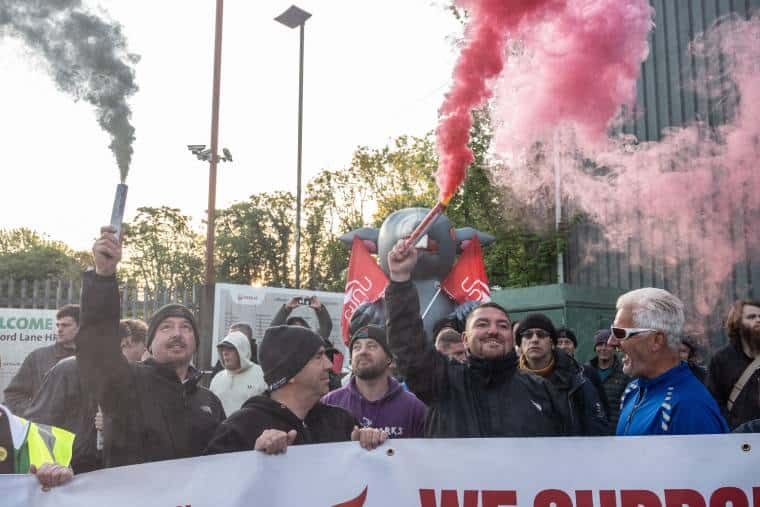The challenge now is to build on its success and keep up solidarity work
By Tomáš Tengely-Evans
Downloading PDF. Please wait…

Trade unionists and supporters from across the country got organised to join the mass picket
When Labour declared war on the Birmingham bin workers, it thought it would force the strikers back to work.
But on Friday Labour and the bosses were on the run.
The Labour council—at the behest of the Labour government—has used the armoury of the state to run a strike-breaking operation. The police, the military, emergency powers and an army of scab vehicles have been used to undermine the Unite union’s indefinite strike in the city.
From 6am on Friday, hundreds of trade unionists, students and campaigners picketed outside the Lifford Lane depot on the outskirts of Birmingham.
They came from London, Leeds, Sheffield and further afield in cars and minibuses, as well as from Birmingham.
This “mega picket” was a glimpse of the power to humble—and defeat—the scab Labour government and bosses.
The Labour council bosses faced a choice—take on the mass picket or back down. They buckled.
One van tried to leave the depot early. But strikers blocked it. The council shut the depot for the day. It did not call the police in against the picket.
Birmingham showed the power of a picket line to stop scabbing and bring things to a halt through mass numbers.
The mega picket has a far wider political significance—beyond Birmingham and beyond the dispute itself.
If you’re on the left, you’ve probably felt down in the mouth after last week’s local elections in England.
We face a failing Labour government pushing austerity mark 2 and copying the right’s agenda—whether on immigration, trans+ rights or climate change.
Almost every move that Starmer makes feels like it’s designed to widen the gulf between Labour and millions of people who voted for its promise of “change”.
Yet it’s the far right that has made the running against Keir Starmer. Nigel Farage’s Reform UK party now has another MP, controls ten councils, two regional mayors and has over 700 councillors.
As striking bin worker Derek told the mass picket, “Any hope of a new Labour government bringing an end to this misery is quickly evaporating.
“One of the most disappointing aspects of this dispute is that these attacks are being undertaken by not only a Labour-run authority but a Labour government.
“It’s allowing populist chancers like Farage to fill the vacuum—left unchecked it will only get worse.”
Reform UK preys on people’s despair and disillusionment with the main parties, but then wraps racism around every issue.
Faced with Reform UK’s insurgency, you’ve probably asked, “Where the hell is our side? Are the unions going to fight back? When will the left get its act together?”
On Friday, we got a glimpse of what happens when our side moves, a glimpse of an alternative based on struggle.
Pushing back Reform UK requires mass campaigning through Stand Up To Racism (SUTR) that takes on lies about immigration.
But our class going on the offensive would transform the terrain we’re fighting on—it could show there is a hopeful alternative to Starmer.
When the working class fights back, people feel less powerless. They are less isolated and can look to collective solutions and be less susceptible to blaming migrants, trans+ people and minorities.
Class struggle focuses anger against the real enemy—the 1 percent at the top of society.
However, victory is far from inevitable—strikes are not won in a day.
A path to winning demands two things—building on the success of the mass picket and a shift in strategy from the Unite leadership.
When the Labour council sent in the police, Unite’s leaders said they would mount a “legal challenge”. That alone would never shift Labour and the bosses. As the weeks dragged on, the bosses used scab labour to clear mountains of rubbish and announced new attacks on bin workers’ pay.
Socialist Worker argued, “The Unite leadership should call for mass pickets outside the depots and appeal for other workers to join them in solidarity.
“A mass picket would shame Labour, the council bosses and the police and thwart their strike breaking.
“A mass picket could stop lorries going out and appeal to agency workers currently being used as scab labour to support the strike.”
Hundreds of people tested that strategy on Friday—and it worked.
Organised socialists were key to making it happen through We Demand Change and other networks.
An important lesson is don’t wait for union leaders to move—the actions of ordinary trade union members and their supporters is what shifts them to back the action we need to win.
Now, the challenge is to do it again—but bigger.
First, the next step in Birmingham is building mass pickets outside all three depots to stop the scabbing operation. This could bring pressure to bear on the Labour council and government. That is no easy undertaking and will require more trade unionists and campaigners coming out to support the workers.
Second, it means keeping up the solidarity work in the labour movement. The tours in Manchester and Bristol, where bin strikers visited workplaces, need to be replicated in towns and cities across Britain. Get a bin worker to speak at your union branch, do a collection at work or on your campus.
And if you’re in Birmingham, don’t wait for the next mass picket. Go down to the picket lines with a delegation to show support. This has to be a turning point for the level of solidarity in the city.
Strikers need to shape the escalation and not wait for the officials.
There are times in working class history that mark a fork in the road and show the possibility of our side winning. The mass picket in Birmingham is one of those times—but only if we build on its success. Let’s seize the chance to turn the tables in Starmer’s class war on us all.